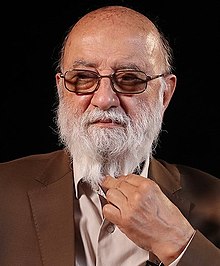Mehdi Chamran
Mehdi Chamran | |
|---|---|
 | |
| Chairman of City Council of Tehran | |
| In office 3 September 2014 – 22 August 2017 | |
| Deputy | Morteza Talaie |
| Preceded by | Ahmad Masjed-Jamei |
| Succeeded by | Mohsen Hashemi Rafsanjani |
| In office 29 April 2003 – 3 September 2013 | |
| Deputy | Hassan Bayadi |
| Preceded by | Mohammad Atrianfar |
| Succeeded by | Ahmad Masjed-Jamei |
| Member of City Council of Tehran | |
| In office 29 April 2003 – 22 August 2017 | |
| Personal details | |
| Born | 9 September 1941 Tehran, Iran |
| Political party | Popular Front of Islamic Revolution Forces Alliance of Builders of Islamic Iran |
| Alma mater | University of Tehran |
| Signature |  |
| Military service | |
| Allegiance | |
| Branch/service | Irregular Warfare Headquarters |
| Battles/wars | Iran–Iraq War |
Mehdi Chamran (Template:Lang-fa) is an Iranian architect and conservative politician who last held office as the chairman of City Council of Tehran.
Early life and education
Chamran is the brother of Mostafa Chamran.[1] They were both members of the "Red Shiism", a radical group that was founded by Mostafa in the US in 1965.[2]
Career
Chamran served as the head of Iran's external intelligence. He was among those who contributed to the Iran's nuclear development program from the start.[3] He was the chairman of the City Council of Tehran[4] from 2003 to 2013. He received the most votes from the Tehrani electorate in three of the elections he was elected in, in 2003, 2006 and 2013.
A major supporter of Mahmoud Ahmadinejad during his mayorship,[5] Chamran turned towards Mohammad Bagher Ghalibaf and his supporters during the 2006 elections,[6] which resulted in a three-way split of the third Tehran council between the two conservative factions and reformist candidates. Comparatively, the second council only consisted of conservative members and the first council mostly of reformist members.
References
- ^ Shaery-Eisenlohr, Roschanack (2008). Shiʻite Lebanon: transnational religion and the making of national identities. Columbia University Press. p. 171. ISBN 978-0-231-14426-1.
- ^ Barsky, Yehudit (May 2003). "Hizballah" (PDF). The American Jewish Committee. Archived from the original (Terrorism Briefing) on 29 October 2013. Retrieved 5 August 2013.
- ^ Jesper, William F. (31 August 2009). "No state sponsors, no terror". The New American. Retrieved 5 August 2013.
- ^ "Imam Musa Sadr Was Imam Khomeini's Right Hand in Arab Countries". AhlulBayt News Agency. 8 March 2011. Retrieved 15 March 2011.
- ^ Gheissari, Ali (2009). Contemporary Iran: economy, society, politics. Oxford University Press. p. 284. ISBN 978-0-19-537849-8.
- ^ Naji, Kasra (2008). Ahmadinejad: the secret history of Iran's radical leader. I.B. Tauris. p. 62. ISBN 978-1-84511-636-1.
External links
- Use dmy dates from August 2013
- 1941 births
- Living people
- Alliance of Builders of Islamic Iran politicians
- Iranian Irregular Warfare Headquarters guerrillas
- Chairmen of City Council of Tehran
- Popular Front of Islamic Revolution Forces politicians
- Presidential advisers of Iran
- Tehran Councillors 2013–2017
- Tehran Councillors 2007–2013
- Tehran Councillors 2003–2007
- Iranian politician stubs
